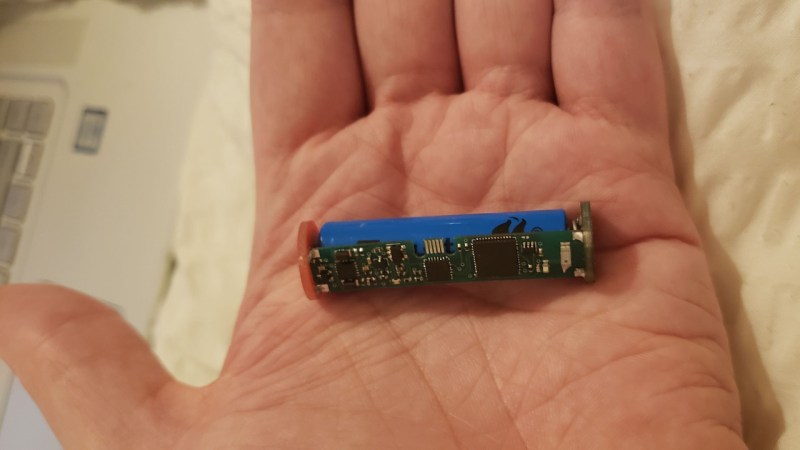Internet-connected sex toys are a great way to surprise your partner from work (even the home office) or for spicing up long-distance relationships. For some extra excitement, they also add that thrill of potentially having all your very sensitive private data exposed to the public — but hey, it’s not our place to kink-shame. However, their vulnerability issues are indeed common enough to make them regular guests in security conferences, so what better way to fight fire with fire than simply inviting the whole of Twitter in on your ride? Well, [Space Buck] built just the right device for that: the Double-Oh Battery, an open source LiPo-cell-powered ESP32 board in AA battery form factor as drop-in replacement to control a device’s supply voltage via WiFi.

In their simplest and cheapest form, vibrating toys are nothing more than a battery-powered motor with an on-off switch, and even the more sophisticated ones with different intensity levels and patterns are usually limited to the same ten or so varieties that may eventually leave something to be desired. To improve on that without actually taking the devices apart, [Space Buck] initially built the Slot-in Manipulator of Output Levels, a tiny board that squeezed directly onto the battery to have a pre-programmed pattern enabling and disabling the supply voltage — or have it turned into an alarm clock. But understandably, re-programming patterns can get annoying in the long run, so adding WiFi and a web server seemed the logical next step. Of course, more functionality requires more space, so to keep the AA battery form factor, the Double-Oh Battery’s PCB piggybacks now on a smaller 10440 LiPo cell.
But then, where’s the point of having a WiFi-enabled vibrator with a web server — that also happens to serve a guestbook — if you don’t open it up to the internet? So in some daring experiments, [Space Buck] showcased the project’s potential by hooking it up to his Twitter account and have the announcement tweet’s likes and retweets take over the control, adding a welcoming element of surprise, no doubt. Taking this further towards Instagram for example might be a nice vanity reward-system improvement as well, or otherwise make a great gift to send a message to all those attention-seeking people in your circle.
All fun aside, it’s an interesting project to remote control a device’s power supply, even though its application area might be rather limited due to the whole battery nature, but the usual Sonoff switches may seem a bit unfitting here. If this sparked your interest in lithium-based batteries, check out [Lewin Day]’s beginner guide and [Bob Baddeley]’s deeper dive into their chemistry.
















Twitter becomes twatter?
wasn’t it always?
Technically is it the worlds biggest virtual gangbang. A Guinness World Records maybe ?
Some funny and appropriate line on their website:
“Ideal when time is not so pressing, but you have a talent to share with the world.”
“The perfect choice if you’ve got a short deadline to hit.”
( https://www.guinnessworldrecords.com/records/apply-to-set-or-break-a-record/ )
I love the design! I’m actually in the process of building something with a similar form factor.
-the OH +solar charger and battery protection :)
https://hackaday.io/project/174959-solar-node-swiss-army-knife
some feedback would be very much appreciated
Use no tooth except Bluetooth
I don’t know that I’d be comfortable inserting a LiPo inside me…
the danger element can be kind of fun. but the 10440 is a canned cell and not one of those explosion happy flat cells used in smart phones. provided proper protection circuitry and they didn’t skimp on the thermistor, as my butt plug can get really hot during one of my sessions, don’t want to invite a thermal runaway. id also make sure its well sealed. many a time ive had lube get in there and mess up the battery. and that’s a normal battery, who knows what it would do to a lithium cell and its battery management circuitry. a good application of heat shrink would be appropriate.
In my opinion, I’d rather keep HaD PG… I don’t think that things like this are appropriate.
I think that, the way this is written, this _IS_ PG. Aside from a single use of the word “sex” everything else is implication. PG stands for “Parental Guidance”, so it doesn’t have to be completely clean, but you can’t really get anything purient out of this article that you didn’t bring here yourself.
Tbf, my first thought was that it was ideal for kids toys rather than adult ones…
So you click on a button on the web server to run lower the voltage to fake dead over 2 to 5 minutes and say to a very young child “I’m sorry, but the battery is dead. And we do not have any spares, and the stores are all closes. Anyhow it is time for bed now.”
If a child reads this article and understands what it’s about it doesn’t matter. And if a child reads this and doesn’t understand what it’s about it doesn’t matter. So there’s no issue.
Grow up. Sex is normal, stop trying to make it something that shouldn’t be talked about.
Whoa, thanks for all the negative replies. I guess this isn’t the inclusive community I thought it was. I certainly wont be coming back.
You did begin this conversation by wanting something excluded.
“I don’t want even vague, thinly veiled references to sex on a site I visit! Also, the site has to be inclusive at the same time!”
You don’t ask for much do you? Also none of those comments were negative outside of the broadest definition of the word, as in they were negative because they disagreed with you, which lands the negativity squarely in “in your opinion” territory.
That was the problem. They disagreed…
“I certainly won’t be coming back.”
Ouch, this is devastating. How will we ever manage to carry on? The Hackaday comments section… Nay, the very fabric of space-time itself is now in jeopardy of coming unraveled!
“private data”
“privates data”
Funny how incredibly fickle language can be… a single letter makes a big difference!
Clarity: not whining about a typo. There is no typo here. (Also there is no spoon.)
me: my privates got hacked!
it professional: have you secured your wifi?
me: no you dont understand, i want it to be hacked more!
certainly brings new meaning to the term ‘honeypot’.
There was definitely a spoon when the night shift took over.
Thread lacks video, lol
I would like a 3D printed case and STL for it.
this is just to put into existing non-smart battery powered sex toys.
You’d put this in your dollar store dildo and now your bargain bin buzzer is a IoT sex toy.
Sooo… That thing will have some kind of case, no? Or does it get inserted like that..
Well, it’s “just” a battery with WiFi. Never insert batteries without a solid retrieval plan!
this is just to put into existing non-smart battery powered sex toys.
You’d put this in your dollar store dildo a
this is just to put into existing non-smart battery powered sex toys.
You’d put this in your dollar store dildo and now your bargain bin buzzer is a IoT sex toy.